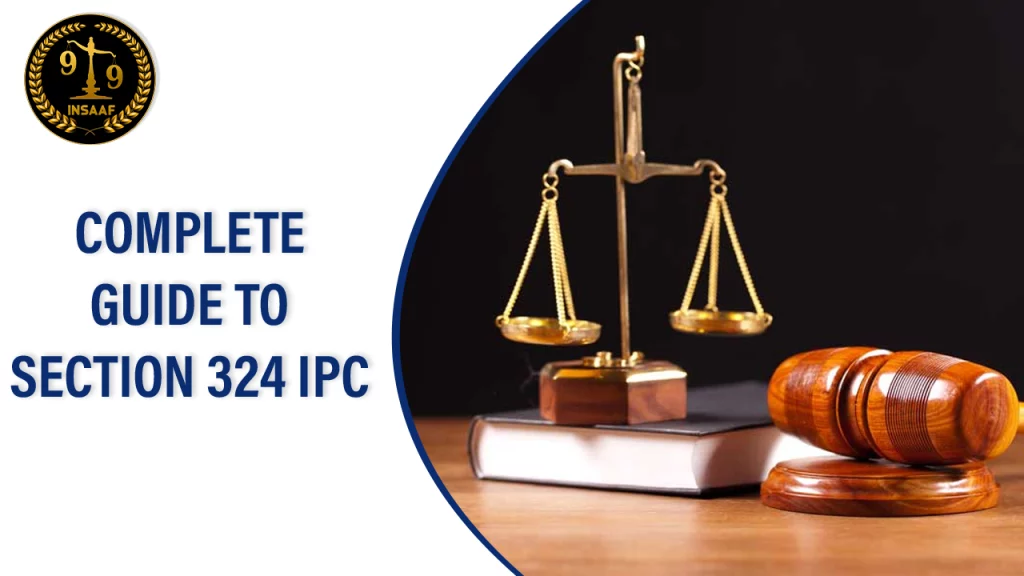

Online Legal Advice from Insaaf99® Online Lawyer Consultation in India


Online Legal Advice from Insaaf99® Online Lawyer Consultation in India

Introduction of Section 324 IPC
In cases involving Section 324 of the Indian Penal Code (IPC), where people intentionally cause harm with deadly weapons or means, the parties and the community often experience a complicated combination of emotions. These complex emotional responses highlight the necessity for a balanced legal system that handles both punishment under IPC and rehabilitative parts of such cases to prevent future tragedies.
Section 324 of the IPC covers voluntarily causing harm with dangerous weapons or means. Indian criminal law relies on this provision to distinguish and punish deliberate injuries caused by harmful means or weapons. It recognizes the seriousness of the injury committed but provides a less severe legal framework than grave hurt (Section 325 IPC).
Understanding Section 324 IPC is crucial for several reasons. It classifies offenses by harm and guarantees appropriate sanctions. This clause recognizes the seriousness of causing harm with dangerous weapons or substances but provides less severe legal repercussions than grievous hurt situations. It deters violence and protects the public.
Section 324 IPC fines, bail provisions, and legal repercussions must also be understood. To comply with the law, individuals and lawyers must be informed of potential penalties, including jail and fines. Knowing whether offenses under this clause are bailable or not is crucial to a person's liberty throughout legal processes. This understanding also helps defense and prosecution lawyers create effective Section 324 IPC strategies. Section 324 IPC is a major Indian criminal law statute that handles intentional harm by dangerous means. Legal compliance, access to justice, and effective law practice need to understand its ramifications.
Intentionally harming another with weapons or other potentially harmful means is defined and punished under section 324 of IPC. Let us take a look at the exact wording for IPC 324
Whoever, except in the case provided for by section 334, voluntarily causes hurt by means of any instrument for shooting, stabbing, or cutting, or any instrument which, used as a weapon of offense, is likely to cause death, or by means of fire or any heated substance, or by means of any poison or any corrosive substance, or by means of any explosive substance, or by means of any substance which it is deleterious to the human body to inhale, to swallow, or to receive into the blood, or by means of any animal, shall be punished with imprisonment of either description for a term which may extend to three years, or with fine, or with both."
Section 324 serves as a crucial legal tool in maintaining public safety and order. Understanding this section is vital, as it distinguishes between degrees of harm and defines penalties, which may include imprisonment and fines.
The penalties for the deliberate infliction of harm using dangerous methods or instruments, as outlined in Section 324 IPC, entail imprisonment for up to three years, a monetary fine, or both. The gravity of these sanctions lies upon several determinants, including the severity of injuries, the perpetrator's intent, their criminal history, and the presence of aggravating or mitigating elements.
To illustrate, a deliberate stabbing resulting in grave harm is likely to result in a lengthier prison sentence compared to an inadvertent incident causing minor injuries. Similarly, an individual with a history of violent offenses is expected to face harsher repercussions than someone lacking prior criminal convictions.
Ultimately, the discretion to determine an appropriate sentence rests with the presiding judge in a criminal case, who carefully considers all pertinent factors in rendering a verdict.

The offenses registered under section 324 of the Indian Penal Code are non-bailable. This implies that individuals accused of such offenses have no intrinsic right to obtain bail. Before making a bail determination, the court must evaluate the specifics of the case.
The court determines bail based on a number of factors, including:
Should the court decide to grant bail, it may impose certain conditions, such as the surrender of a passport or the prohibition against contacting the victim or witnesses. In cases where bail is denied, the accused retains the option to challenge the decision by filing a habeas corpus petition.
In the end, the decision to grant bail is solely at the discretion of the court.
Section 324 of the Indian Penal Code (IPC) covers deliberate harm by dangerous methods. This act can result in a three-year prison sentence, fines, or both, depending on the perpetrator's intent and the severity of the injury. The judiciary decides whether to issue bail for bailable or non-bailable charges based on certain conditions. The incident's details, the evidence's strength, the individual's chance of leaving, their criminal record, their community links, and their financial resources must be considered. This provision seeks to balance justice, deterrence, and public safety, giving judges the discretion to make case-specific decisions while protecting individual rights.
Insaaf99, an online legal consultation firm, offers vital assistance in IPC 324 cases. They provide expert legal advice, helping individuals understand their rights and legal options. Clients can access experienced lawyers who specialize in criminal law, guiding them through the complexities of Section 324 IPC. Insaaf99 aids in case preparation, ensuring a strong defense or prosecution strategy. Moreover, they facilitate access to bail provisions, assisting clients in securing their release when applicable. With their expertise and resources, Insaaf99 plays a crucial role in navigating Section 324 IPC cases, striving for fair and just legal outcomes.
Also Read